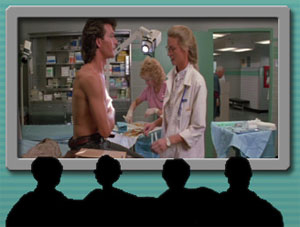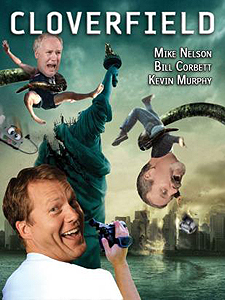Please Don’t Spoil The Movie By Adding Your Own Soundtrack: An Interview With Mike Nelson
Published on July 30th, 2008 in: Comedy, Current Faves, Interviews, Issues, Movies, Underground/Cult |Popshifter: Now when you choose a movie to riff to, do you usually watch the movie a couple times before riffing, or do you just come up with stuff on the spot? How does that work?
Mike Nelson: It doesn’t really require a whole run-through because you can really get the tone or the consistency of it from watching maybe half of it. But enough of it to get the elements that you want to see. If there’s some goofy element or a pacing or just something that you know that if there’s moments or scenes that excite you, then you can kind of use it as a tent post for the rest of it. And we’ve done enough of it now to learn that there’s not a lot of movies that are just totally off limits or undoable because there’s always a way in. Well, not always, but for the most part there is.

Popshifter: That was actually one of my other questions: Is nothing sacred?
Mike Nelson: Well, I think there would be. There’s just stuff that the tone of it, the subject matter, is just inappropriate to having laughs at it. But in terms of quality, first of all it’s a voluntary thing to listen to, so you’re not destroying someone else’s work. It’s just like if you’re watching a movie with friends and somebody starts wisecracking to it, it doesn’t take away from the movie. And also, we’ve done movies that we like. So it isn’t always that when we pick a movie, it doesn’t mean, “Oh, this is a piece of crap. Let’s trash all over it.” It’s really just a different way of doing comedy, of sort of riding on top of this other experience. Sometimes you’re putting words in the mouths of characters, sometimes you’re observing things, and sometimes it’s the three of us having fun outside of it. So there’s a lot of different ways to go about it rather than just saying, “Oh isn’t this a stupid movie? Look at that dumb guy!” It doesn’t work that way 99 percent of the time.
Popshifter: Exactly, yeah. A lot of the jokes are, well I would consider them to be quite clever. And just the way that you guys point out things that most people would not even notice. Is that something that as a skill is fine-tuned over time, or were you just always able to do that?
Mike Nelson: No, I’ve learned a lot. That’s the joy of my work, is the craftsmanship of it. To be able to piece together all these different parts and make them work. Because there are times where you realize that there’s a lot of good jokes available for a certain spot but you kind of either have that energy or rhythm already and you’ve done it in a way where you have to lose certain parts. So there’s a lot that goes into it rather than just “what’s the best joke for this situation?” The whole rhythm and flow of the whole script that you have to pay attention to as well. And also there’s an attitude. The favorite part of my job is the stuff that gets thrown away. It’s making those decisions where I could have 70 jokes for a certain spot and I threw 69 of those away and this is the one that I ended up with. That’s really satisfying to me, being able to throw away a lot of stuff and really make sure it’s the best thing in there.
Popshifter: Do you meet with the other Riffers beforehand and compare notes and that kind of thing? Do you come up with a script or when you’re actually watching the movie and recording yourselves, is it a lot of instinctual reactions?

Mike Nelson: It’s a combination of both. We write scripts in advance. We change them a lot as we perform. Especially when we do live shows and have a chance to do them again; that experience is invaluable and that’s pretty fun. We’ll have a pretty long writing session the day after doing the live show if we’re going to ever perform that again and just do all the notes like, “Boy, this joke that we just though was killer just didn’t do anything,” which is kind of rare, but funny when it happens. The three of us have had a lot of experience in this kind of thing are all thinking, “How did we miss on that one?”
A lot of things are just adjustments and a lot of it is with the audience. Are they able to hear and digest two jokes in a row? Is there a huge laugh that obscures the set-up of the next one? So it’s a lot of that adjusting and shuffling and sorting.
Popshifter: After so many years of doing Mystery Science Theater 3000 and now RiffTrax, do you ever just go to the movies for the fun of it?
Mike Nelson: I do, but rarely because I have a pretty good home theater rig and so the stuff that I really want to see I just watch at home. I’ve become someone disillusioned when I go to the theater—and this will be pretty funny and I can’t help the irony of this—it’s just that the people in the crowd talking through the whole thing bug the hell out of me. (laughs) and it’s really hard to enjoy it. Whereas we’ve never advocated, nor do I ever myself talk during a movie except when I go with a group of friends and we’re the only ones in the theater. That can be kind of fun. But otherwise, I just enjoy watching them at home.
Time limit is exhausted. Please reload the CAPTCHA.